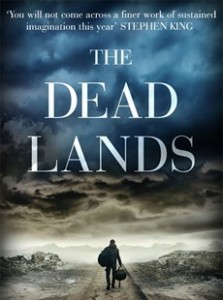THE DEAD LANDS
Benjamin Percy
Hachette Australia, April 2015, R.R.P. $29.99
It seemed fitting to be reading post-apocalyptic event fiction about a parched city as we move officially into an El Niño event. Thankfully we will have a couple of months of respite thanks to the Indian Ocean Dipole. Not so in the Sanctuary, a fortified city once known as St. Louis. Here water is precious, the city’s wells are guarded and the contents rationed.
In this rather depressing future, most of humanity has been wiped out by what began as a rather vicious strain of influenza and ended in a nuclear missile volleying match.
The Sanctuary has walled itself off from the radioactively mutated terrors of the lands outside the walls. Water is scarce but the mayor keeps a nice fresh supply for his bubble baths. Just the sort of person you’d want running your city toward a totalitarian regime. Fun.
When a teenage girl with black eyes arrives outside the walls, the people finally have proof of human survival outside the city. A small group of rebels decide to escape and seek out the rumoured green lands in the west.
To get there they must survive harsh weather, marauding slavers and an assortment of giant mutated creatures. Though I couldn’t help but wonder at the features of some of these species. Where I could only see evolutionary disadvantages I had to console myself that they survived thanks to a lack of predators, but that is by the bye.
Benjamin Percy has created a noteworthy take on a genre that seems now to be overflowing with entrants for worst possible futuristic calamities. His imaginative creations populate the story along with his fully formed characters and a well developed world.
While I can’t say I found it unputdownable*, it was an enjoyable story told with a proficiency of language I can only dream of acquiring.† The end, however, was an ambivalent affair for me being a mix of neat wrap up for some characters and a what-the-hell-was-the-point-of-all-this feeling for others.
In all, I cannot honestly say I understood what a reader is meant to come away with at the end of all this other than humans cannot populate Earth without destroying it. That is a fair assessment given, y’know, the whole of human history. Of course, if you are of a more optimistic bent you can go with a life will find a way philosophy. Humans, like the more kick-arse members of the archaebacteria, will find a way.
* Please forgive me the use of this affront to the senses.
† See use of the word unputdownable.

